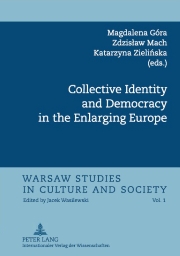 The enlarged and enlarging European Union is a novel political project in motion. The supranational institutions created for six member states over 50 years ago are influencing the everyday lives of more than 500 million European citizens in 27 countries. In addition to being national citizens, such as French, Polish or Hungarian, they are now also Europeans. This generates the following questions. How do ongoing political processes affect who the Europeans are? What is the content of their reconstructed identity? What are the consequences of changes in collective identity formation for political processes in Europe?
The enlarged and enlarging European Union is a novel political project in motion. The supranational institutions created for six member states over 50 years ago are influencing the everyday lives of more than 500 million European citizens in 27 countries. In addition to being national citizens, such as French, Polish or Hungarian, they are now also Europeans. This generates the following questions. How do ongoing political processes affect who the Europeans are? What is the content of their reconstructed identity? What are the consequences of changes in collective identity formation for political processes in Europe?
This volume is the result of five years of research on the link between democracy and the functioning of the European Union, undertaken as part of the RECON project. It brings together contributions covering recent research dealing with the changing nature of collective identity formation processes in contemporary Europe. A number of RECON-affiliated scholars contribute to the volume: Magdalena Góra and Zdzislaw Mach, Ulrike Liebert, Nora Fisher Onar and Meltem Müftüler-Baç, Mária Heller and Borbála Kriza, Marcin Galent and Pawel Kubicki, Beata Cjajkowska, Dariusz Niedzwiedzki, and Katarzyna Zielinska.
The book is an elaborated version of RECON Report 12, which has been reedited and enriched with some additional contributions.
Full info:
Collective Identity and Democracy in the Enlarging Europe
Warsaw Studies in Culture and Society, Vol. 1
Magdalena Góra, Zdzisław Mach and Katarzyna Zielińska (eds), Peter Lang, 2012